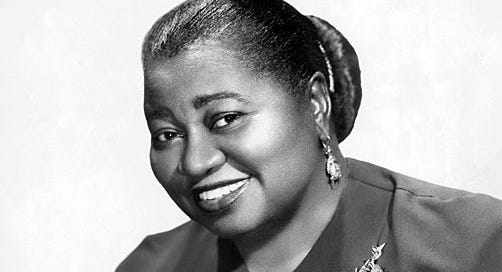The talented Hattie McDaniel was born in Wichita, Kansas in 1895, one of 13 children born to parents Henry McDaniel, a formerly enslaved man who fought for the Union Army in the Civil War, and her mother, Susan, who also had been enslaved. McDaniel's family moved to Denver, Colorado when she was a child, where she graduated from Denver East High School.
Hattie McDaniel
Upon finishing high school, McDaniel formed a troupe with several siblings that performed in traveling minstrel shows; for the next decade, McDaniel performed both live and on radio until the Stock Market crash of 1929, one which subsequently led to the Great Depression. With funds from performing low, McDaniel took work as a washroom clerk and waitress in Milwaukee, Wisconsin and in 1931, McDaniel moved to Los Angeles, where she again worked as a laundry attendant while seeking work in the entertainment industry.
By 1934, McDaniel had joined the Screen Actor’s Guild and was fielding roles playing maids in numerous Hollywood films. This work allowed her to become close friends with many of the leading actors and actresses of her time, including Lionel Barrymore, Gene Harlow, Olivia De Havilland, and Clarke Gable, the latter two who would appear with her in the classic film adaptation of Margaret Mitchell's novel, "Gone With the Wind (GWTW)."
McDaniel, as “Mammy,” in a scene with Scarlett O’Hara, played by Vivien Leigh…
Producer David O. Selznick selected McDaniel to play the role of "Mammy," an uneducated but extremely wise enslaved maid to the O'hara family who serves as both surrogate mother and conscience to the film's leading female character, Scarlett. When the film debuted in Atlanta in 1939, the strict nature of Jim Crow segregation prevented McDaniel and Butterfly McQueen, who played the role of the enslaved maid "Prissy," from attending the premier. Infuriated, Clarke Gable, who played the leading role of Rhett Butler, threatened to boycott the premier—until McDaniel urged him to reconsider.
The following year, McDaniel made history by becoming the first Black person to win an Academy Award as she took home the Oscar for Best Supporting Actress for her efforts in GWTW. Despite her success, McDaniel was still the subject of criticism from some within her own race, many of whom felt that her playing a maid in so many films was demeaning. Undaunted, McDaniel once snapped back in an interview that, "I would rather play a maid than to be one."
McDaniel later earned two stars on the Hollywood Walk of Fame, one for her work in radio and the other for her work in film. McDaniel died in 1952 and in 1975, she was inducted into the Black Filmmakers Hall of Fame.
Lest we forget…





